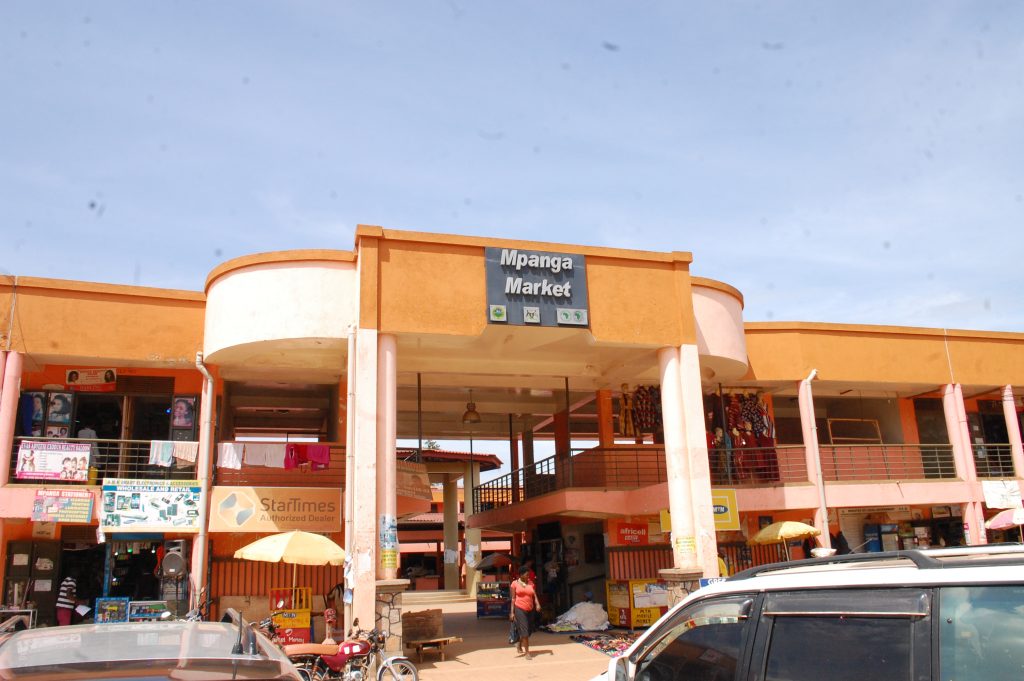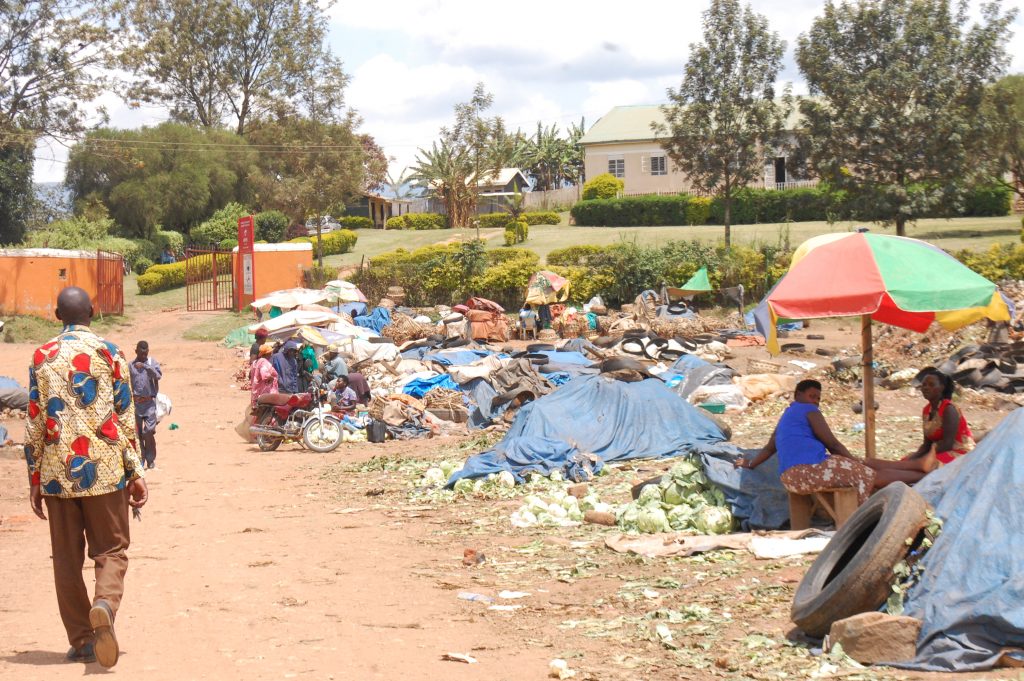
BY INNOCENT KIIZA
Mpanga Main market in Fort Portal newly created city, Kabarole district started in 1957. The government recently developed it into a modern market under MATIP phase one, handing it over back to vendors in 2015.
Before the construction of the modern one, the old market had suffered two firebreaks in 2007 and 2009, according to the chairperson of the vendors, Stanley Sabatti.
He said in 2010, the Ministry of Local Government held a meeting with the vendors and shared with them the vision of developing the market into an urban-standards market, which vendors accepted on condition that they should be relocated to a good place.
Construction kicked off in 2012 after the registration of vendors and signing MATIP agreements. However, he added, the process affected vendors’ capital because they had to build their own stalls and lockups in the relocation area.
He added that the ministry issued Shs 60 million for the vendors’ relocation process but the council only leveled the ground, worked on water extension to the place and provided security on the relocation place, which was a small pitch ground.
Vendors were not content with the work council did with the funds, and reported their issues to the ministry which intervened and lighting was worked on. However, Sabatti stressed, no one was compensated although some vendors lost their things in the process.
WHY VENDORS ABANDONED THE MARKET
Christopher Asiimwe, the market master, said when the market was completed and handed over to the vendors, all the lockups and stalls were occupied and there was demand for more. Some rooms were subdivided to create more space for vendors who continued to register for occupancy.

However, during the 2016 election campaigns, the mayor made political pronouncements about the three main farmers’ days, relocating them to a roadside market which he argued was more accessible to everybody.
The trend changed since those pronouncements; vendors started shifting their products to outside markets, which are nearby, thereby abandoning the Mpanga work spaces.
“That’s why you are seeing almost half of the stalls are unoccupied,” Asiimwe said.
Asiimwe added that the mayor, on one of the radio talk shows, encouraged farmers to take their products to the neighboring markets which competed with Mpanga market yet the foundation of Mpanga is agricultural products.
As the vendors dealing in agricultural produce started to leave the market to where the farmers their main suppliers were, this adversely affected the customer turnout and revenue collection for Mpanga.
Shortly after the elections, the vendors adapted by carrying out their business outside the market, claiming they no longer made money in Mpanga. This left almost half of the market work space abandoned.
As they saw the situation rapidly changing for the worse, Asiimwe said, the market authorities wrote to the town clerk, who held a meeting with vendors to iron out a solution.
The meeting identified the challenges like limited accessibility of Mpanga which was continually affecting revenue collection.
Asiimwe says the current monthly revenue collection is Shs 13.5 million, against a projected Shs 17.4 million.
The outside roadside market at Kabondeire is a beehive of activity on the three gazette farmers’ days – Monday, Wednesday and Thursday. The whole population, hotel and restaurant owners, supermarkets and families come to buy direct from farmers on cheap prices on these days.
Asiimwe said they have written to the town clerk and mayor to gazette at least two of the farmers’ days back to Mpanga Main market as a way to boost the customer numbers.
LEADERSHIP RESPONSE
Responding to the accusations of pronouncements, Rev. Willy Kintu Muhanga, the mayor, denied the allegations but, however, complained that the market was not build on conditions that favor farmers.
He claimed the market structures are not favorable to the users due to limited accessibility which makes business difficult to the public, whereas outside markets are friendly and serve the same purpose.
He decried the market’s poor drainage system, the paucity of entrances, with some of them just invisible and therefore unused. He said the market’s only four entrances are too few for such a building’s size and population.
“We always get challenges when it rains. The septic tanks are broken down and wastes just flow into the public, which is so disgusting,” Muhanga said in a bitter mode.
Muhanga added that the design was bad, especially on the upper floor stalls; there is no proper inlet that links people directly without going through the lower floor.
The old substandard markets, he noted, were much friendly to the whole population whereas these modern markets look very executive, and that makes some people fear to use them.
He noted that there are no cold rooms for fish, meat and fresh crops preservation in case of low sales, which creates an unfavorable situation for vendors and farmers.
Muhanga revealed that the council has passed a budget of Shs 14.5 million to construct more four inlets and outlets to improve on the accessibility and to create a favorable environment for the population amid the corona pandemic outbreak.
“After that, we shall pronounce the shifting of the three main farmers’ days to Mpanga market. I am scared of shifting the farmers’ market days to Mpanga market before the structure is friendly and accessible enough to everybody,” Muhanga said. “We have to work first on all challenging things, starting on the drainage channel to septic tanks.
Bosco Rusoke, the deputy town clerk, told Theinsider.Ug that the council is to engage local contractors to build more entrance points to enable the population access the market more conveniently. He said the work will be done in phases.
VENDOR’S REACTIONS AND TESTIMONIES
Umar Yecob, 26, shoes vendor, I have done shoe vending for five years. Initially I was a hawker but later I joined the market and started operating there. I started with a stock of Shs 200,000, but now I am using Shs 700,000. Since entering the new market, customers have not increased constantly; my rent of Shs 70,000 per month almost finishes all my profits.
However, I have managed to build a house on my inherited land in the village and I look after my daughter and myself. I call this a worthy achievement.
Gorretti Kajuba, a tomato vendor, I used to do business inside Mpanga market at a cost of Shs 10,000 for a stall; however, I wasn’t making as much money as those in outside markets.
Right now I am outside and I don’t pay rent; I pay the daily gate fee of Shs 1,000, and I end up making more profits.
Mpanga Main is a good place to work from, but its poor accessibility curtails profitability.
Mary Kamuaba, vegetable vendor, Mpanga Main market is for corporate, and those who are few makes it hard for business compared to other local markets in the municipality.
Even hawkers, who deal in a variety of things, have made business difficult for us who are stationed in one place waiting for customers.
I believe if political leaders and technical teams could come up with bylaws to restrict hawkers and encourage them to get stalls and lockups, the issue of unoccupied spaces and business competition would be solved.
Having spent 15 years in vegetable business, I have obtained a house where I stay with my family of two daughters and one son.




























